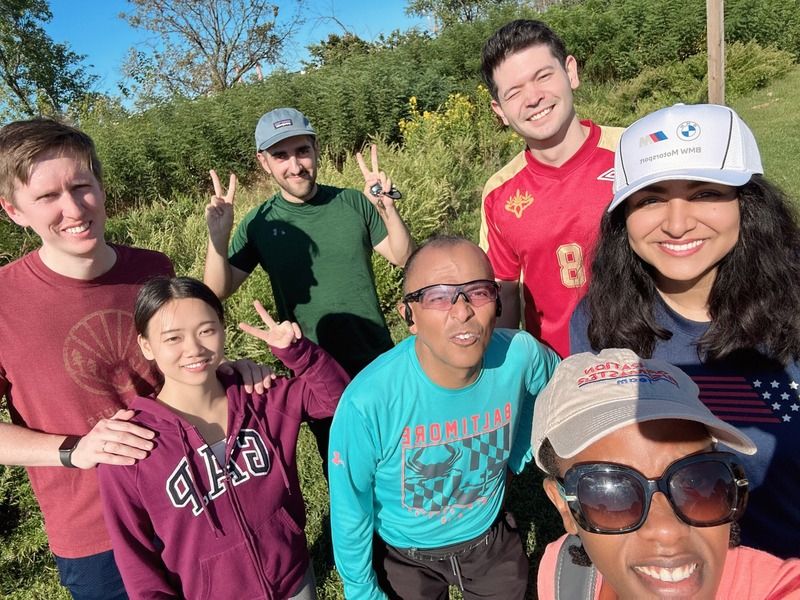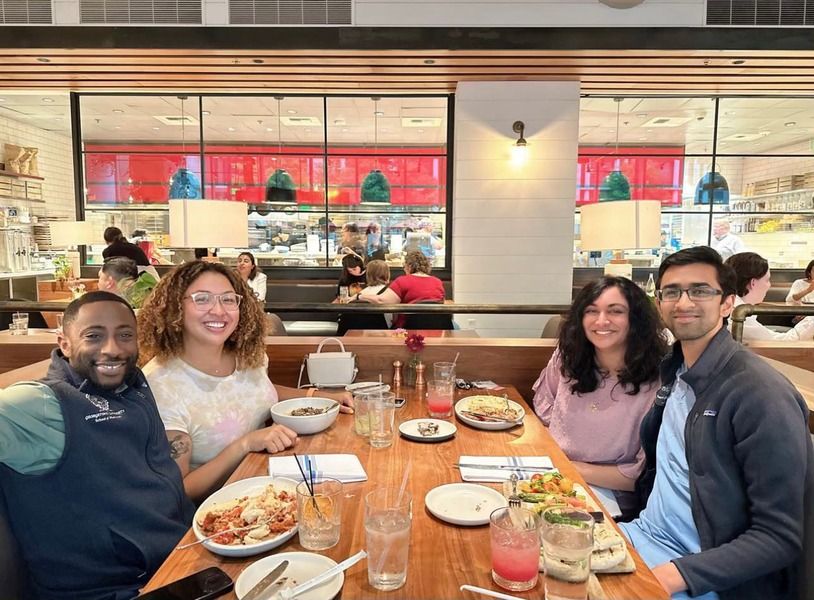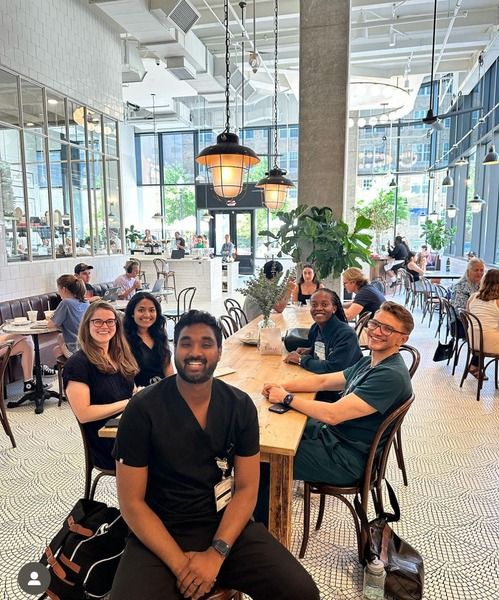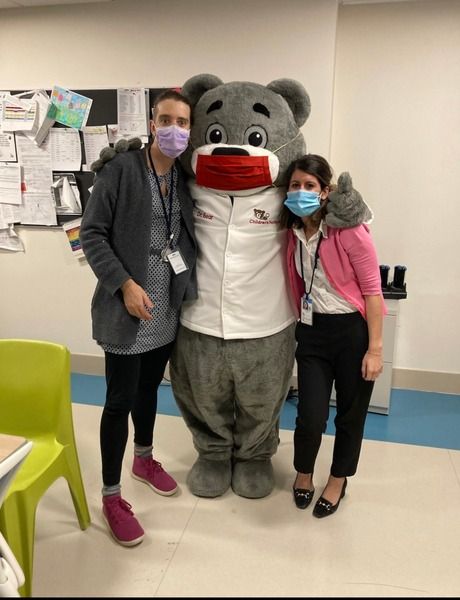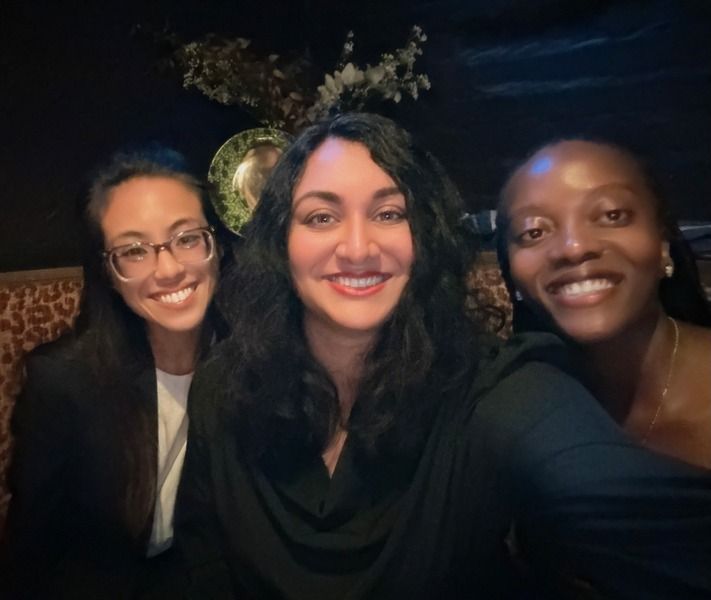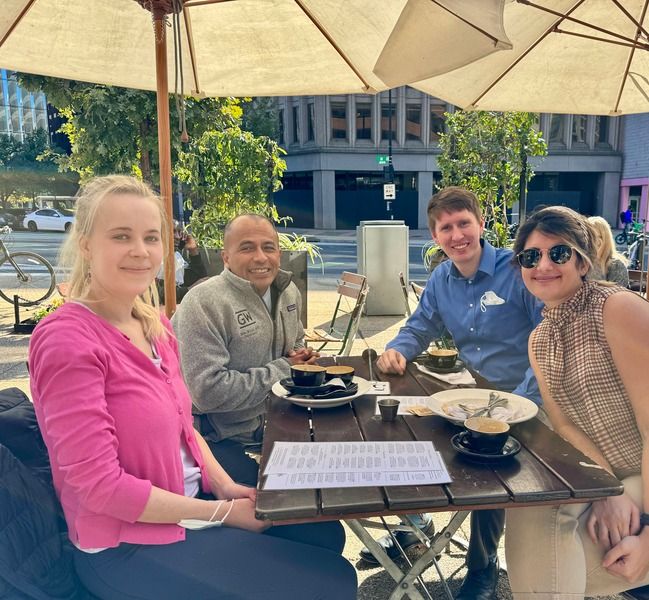Dear Prospective GW Psychiatry Residents,
Welcome to the GW Psychiatry Residency Program – where professionalism meets an atmosphere of camaraderie and enthusiasm for top-notch education.
We want to share with you just how exceptional our program truly is, and why you'll find both professional growth and fun in equal measure:
A Team of Seasoned Mentors: Our faculty isn't just knowledgeable; they're passionate about guiding your journey. Think of them as experienced colleagues and friends you can turn to for advice, all while maintaining the utmost professionalism.
A Dynamic Learning Experience: In the heart of the nation's capital, we provide a platform for you to explore a wide range of clinical settings, serving diverse patient populations. Your education is an adventure, and it's about to get even more exciting.
Diversity and Collaboration: We're proud of the rich tapestry of backgrounds and experiences that our residents bring. This diversity enriches your learning experience, fostering a spirit of collaboration and respect.
Research and Innovation: We are closely aligned with world-class research institutions, allowing you to be at the forefront of pioneering projects and scientific discovery.
Community Engagement: Beyond the clinic, we're committed to making a meaningful impact in our community and beyond. You'll be part of a team that cares deeply about mental health awareness and community well-being.
At GW Psychiatry, we've struck a balance between professionalism and an environment where learning is enjoyable and fulfilling. Our residents graduate as well-rounded, compassionate, and highly skilled psychiatrists, all while forming friendships that last a lifetime.
We encourage you to consider GW Psychiatry as the next chapter in your professional journey. Join us and experience the perfect blend of professional development and camaraderie.
If you have any questions or need more information, don't hesitate to reach out to our program coordinators. We're here to make your experience both enriching and enjoyable.
- Cultural Psychiatry and Global Mental Health
-
Global mental health education, scholarship, and advocacy for human rights are core missions for the George Washington University (GW) School of Medicine and Health Sciences (SMHS) Department of Psychiatry and Behavioral Sciences. Our Global Mental Health Program is grounded in ethical commitments to further mental health and relieve suffering for those who live in low- and middle-income countries and zones of armed conflict, as well as for immigrants and refugees who live in our country. The centrality of global mental health in our department’s mission is also a product of our patient populations, faculty, and institutional resources in metropolitan Washington.
The Washington-metropolitan area is one of our nation's most multi-ethnic regions, with as many as 180 countries and 100 languages represented in District of Columbia and suburban Northern Virginia and Maryland public schools. Complementing this diversity, our full-time and clinical faculty include teachers, scholars, researchers, and clinicians who are internationally recognized for their expertise in cultural psychiatry, torture-survivor rehabilitation, treatment of traumatic stress disorders, ethnopharmacology, medical diplomacy, mental health response to disasters and human catastrophes, human rights advocacy, psychiatric evaluation of refugees seeking political asylum, and development of mental health services in low- and middle-income countries.
Our GMH curriculum provides all our psychiatry residents with expertise that is as usable within the U.S. as it is in low-income countries. At GW, we recognize that GMH skill sets are also those needed for multicultural urban populations and underserved rural populations in the U.S. GMH training is ideal preparation for future community psychiatrists. GMH requires clinicians to learn how to address adversities other than psychiatric illnesses, such as demoralization, grief, loss of dignity, and human rights violations, all of which our residents learn to help patients through using a variety of therapeutic skills. GW teaches residents to support patients in building resilience, not just to treat psychopathology.
All of our residents train in a Global Mental Health curricular thread that spans throughout their training at GW. GW psychiatry residents study global mental health and cultural psychiatry during PGY-II and PGY-III seminars and learn therapies for posttraumatic symptoms. In addition to these didactic global mental health educational opportunities, residents may elect to train in multiple clinical settings applying their learning to clinical practice treating patients in a clinic for immigrants and refugees. The GW Department of Psychiatry and Behavioral Sciences provides the psychiatric component of mental health services at Northern Virginia Family Services, whose multilingual psychosocial programs include the Program for Survivors of Torture and Severe Trauma. Through a year-long, half-day weekly clinic for PGY-III residents at NVFS, residents can grow advanced levels of expertise in psychiatric care for immigrants, refugees, and political torture survivors. At NVFS, residents treat a patient population of immigrants and refugees, collaborating closely with patients’ therapists who also serve as interpreters for non-English-speaking patients. Furthermore, residents can conduct asylum evaluations for political refugees alongside GW faculty members.
Residents also learn in didactics about the role of spirituality in mental health and coping with medical and psychiatric illnesses. Opportunities for further study are available at the George Washington University Institute on Spirituality and Health (GWISH) in educational programs that assist physicians seeking to respond to spiritual needs of patients in their provision of health care. Drawing upon patients’ spiritualities for resilience can be vital for promoting mental health in many cultures.
Residents in the GW Psychiatry Residency Program may explore global mental health interests through educational and research opportunities to complement their clinical training. Residents at GW have the option to pursue additional graduate degrees through part-time studies, including an MPH with complete tuition remission at the leading GW Milken Institute School of Public Health. In MPH studies, residents may choose to focus on global health, health policy, health promotion, or multiple other scholarly tracks. Multiple GW Psychiatry Department of Psychiatry and Behavioral Sciences faculty have joint appointments in the School of Public Health.
Finally, motivated residents have the unique opportunity to contribute to research under the mentorship of psychiatrist and anthropologist Brandon Kohrt, MD, PhD, Charles and Sonia Akman Professor of Global Psychiatry, now leads a GMH division with grant-funded research in 15 countries. Most recently, Kohrt’s research team was awarded an NIMH R01 $2,900,000 grant. Dr. Kohrt’s mental health services research in the GW Global Mental Health EQUITY Lab spans access, availability, affordability, and acceptability of mental health services for those who live in low- and middle-income countries, as well as prioritization of these same GMH principles to the delivery of mental health services in the U.S.
Global mental health has been a good fit for the natural strengths of our department. It also has extended the reach of our person-centered commitment into the wider world. The training that our residents have gained has outfitted them well for psychiatric careers at home or abroad. After 21 years, our global mental health program has shown how the global is also local for psychiatry.
- Child, Adolescent, and Family Psychiatry
-
Since its inception, the GW Department of Psychiatry has been nationally recognized for its focus upon children and families. All child psychiatry faculty at the nationally renowned Children's National Health System also hold joint faculty appointments in our GW department. GW psychiatry residents have more child and adolescent training than most residents in American programs—up to four months. This child psychiatry experience occurs early in residency during the PGY-II year, presenting residents a realistic picture of career possibilities in child and adolescent psychiatry before making a decision in the PGY-III year to apply for fellowship training. From a third to a half of GW psychiatry residents go on to complete child and adolescent psychiatry fellowships.
An innovative family psychiatry curriculum in the PGY-III year teaches residents how to integrate family interventions in general psychiatric practice, how to conduct family-centered care for medically and psychiatrically ill patients, and how to aid individuals struggling to differentiate successfully within their family systems by supporting elaboration of personal self while preserving family relationships. PGY-III residents train in emotionally-focused couples therapy through seminar sessions and weekly clinical supervisions.
Our GW child and adolescent psychiatry fellowship at Children's National Health System is one of the nation’s oldest and most highly regarded child psychiatry fellowships. It provides comprehensive clinical child and adolescent psychiatry training with abundant opportunities to pursue academic and administrative psychiatry, research, and service to public and/or private populations. It provides frequent opportunities to meet with leaders in the field who are creating health policy and research that is shaping current practice. Its clinical foundation is its major teaching services—inpatient, day treatment, outpatient (including infant and toddler psychiatry), and pediatric consultation-liaison psychiatric services, each with separate units for children and adolescents. In addition, there are specific training experiences in emergency psychiatry, community psychiatry, school consultation, and forensic psychiatry. Training also occurs in subspecialty clinics for affective disorders, neurobehavioral disorders, ADHD, autism spectrum disorders, sleep disorders, Infant and Toddler Clinic, and the Feeding Team. For future academic teachers or child psychiatry researchers, a combined clinical/research track divides training time between Children's National and the National Institute for Mental Health (NIMH) over a three-year period. Clinical training in the diagnosis, treatment and clinical management of psychiatrically-ill children and adolescents is integrated with focused NIMH research training on child and adolescent psychiatric disorders.
- Mental Health Advocacy and Public Policy
-
Located a few blocks from the White House and State Department, the physical proximity of GW to the national government, public policy institutes, and headquarters of national professional and non-governmental organizations provides unique opportunities to develop a career at the interface of psychiatry and public policy. GW psychiatry residents can pursue a joint Psychiatry Residency/MPH Degree in Mental Health Policy. The GW Milken Institute School of Public Health (Milken Institute School) is the sole school of public health based in the nation's capital. Department of Psychiatry faculty collaborate with members of the nationally recognized Center for Health Policy Research in the Milken Institute School in multiple areas.
All PGY-III psychiatry residents complete a three-week intensive health policy rotation that combines morning lectures on health policy topics with afternoon field trips to Washington sites where policies are made, ranging from Capitol Hill to the Institute of Medicine. Residents with serious interests in mental health policy and advocacy can matriculate into the joint psychiatry residency/M.P.H. program. Two GW psychiatry residents in recent years have been selected by the American Psychiatric Association as a Jeanne Spurlock, M.D. Congressional Fellow on the legislative staff of a United States Congressman.
The Jerry W. Wiener, M.D. Fund in Psychiatry supports an annual lectureship in mental health advocacy and public policy, as well as attendance at national conferences for PGY-IV residents pursuing scholarly projects in mental health policy and advocacy.
- Forensic Psychiatry
-
Forensic psychiatry, the interface of psychiatry and the law, is a core competency training area in psychiatry residency education. A solid, balanced, interesting, and rich forensic curriculum serves residents in effectively pursuing their career paths and encourages critical evaluation of key issues in general psychiatry. The Forensic curriculum at the GW psychiatry program offers progressive exposure to forensic concepts and practices most relevant to general psychiatry residents.
Starting with the PGY-II year, residents are introduced to fundamental principles and practices of psychiatry as they apply to legal issues. The PGY-II year didactic curriculum is designed to provide a solid grounding in legal issues related to the practice of psychiatry in order to understand the origins and rationale of medico-legal requirements and guidelines. The seminar topics include introduction to the legal system as it pertains to mental health, forensic ethics, malpractice, right to treatment/right to refuse treatment, civil commitment, duty to warn/protect, competency, criminal responsibility, child custody, juvenile justice, and expert witness skills such as testimony and report writing. These didactics are delivered in an interactive format in an extensive 10-week seminar. They are taught by both medical and legal personnel, who are well-versed in confronting complex medico-legal issues, to offer valuable perspectives. By employing this interdisciplinary stance, residents benefit from learning different approaches to the same case material or different views on the same issue.
In the PGY-III and -IV years, residents with an interest in forensic psychiatry are afforded an opportunity to further pursue various forensic electives. Given the prevalence of mental illness in the incarcerated population, correctional psychiatry has become an increasingly important and valued specialty over the years. An elective is available for residents to work with faculty members on forensic cases of both civil and criminal nature. Under the tutelage of the forensic supervisor, residents learn first-hand about forensic processes, including doing a thorough document review, conducting a forensic evaluation, writing a report, communicating with the legal team, giving a deposition, and testifying in court. Residents can also work with Physicians for Human Rights, alongside an experienced supervisor, conducting pro bono political asylum evaluations and providing written affidavits/oral testimony for the court. In addition, residents can participate in court commitment hearings and mock trials with law school students, which can approximate the real life scenario of testifying in a courtroom. These are all excellent learning opportunities for residents to gain hands-on experience and receive direct supervision. Such electives and experiences help residents translate didactic knowledge into practical applications in both clinical and legal settings.
In addition to the specific electives, residents become members of the American Academy of Psychiatry and the Law and are strongly encouraged to present academic forensic projects at its annual national meeting. Residents work closely with their forensic mentors to develop and implement their academic projects, as well as to plan out their future career opportunities.
Underlying all the didactics and electives, a crucial part of forensic training involves developing the ability to review relevant material in a critical, reasoned, and informed fashion, conduct a thorough and objective evaluation, and communicate one’s opinions and recommendations in a concise, easily comprehensible manner. These skill sets are crucial in helping residents lay down a solid foundation for further training in forensic psychiatry; residents graduating from the GW psychiatry residency in the past have gone on to complete their fellowship at prestigious forensic psychiatry programs across the country. More importantly, these skill sets enable general psychiatry residents to become well-rounded clinicians with empathic sensitivity and commitment to quality patient care, who also possess well-informed legal perspectives to serve effectively as advocates, activists, and educators.
- Community and Primary Care Psychiatry
-
GW psychiatry residents learn how to conduct psychiatric treatment on community-based interdisciplinary teams. These include both primary care community health centers and comprehensive community mental health programs for the chronically mentally ill.
The McClendon Center is a District of Columbia Core Service Agency that serves the needs of approximately 700 adults diagnosed with serious and persistent mental illness. Its individualized, multidisciplinary programs seek rehabilitation of patients as persons, by fostering creativity, friendship, stability, independence, emotional growth, and greater participation in the community. The center provides day programming, case management, psychiatric care, and counseling at two sites. McClendon Center is the only Washington, D.C. community mental health agency with accreditation from the Joint Commission on Accreditation of Healthcare Organizations (JCAHO). PGY-III and PGY-IV residents learn community psychiatry and mental health services delivery through their work on McClendon Center interdisciplinary treatment teams.
Pathways to Housing DC is a unique community agency that specifically targets homelessness among people in the District of Columbia who are disabled by mental illnesses. Pathways for Housing has received numerous awards and commendations for the effectiveness of its innovative program, including the Gold Award from the American Psychiatric Association. Most Pathways patients have been both homeless and dually-diagnosed with mental illnesses and substance use disorders. The “housing first” Pathways model provides housing first, then supportive treatment services for mental and physical health, substance abuse, education and employment. Housing is provided in apartments throughout the community. Psychiatric care is supported by 10 ACT teams that make home visits and respond to crises. A walk-in psychiatric clinic is provided at the Q Street NE center. PGY-III and PGY-IV residents learn assertive community treatment and the “housing first” model at Pathways for Housing DC.
Merrifield and Gartlan Mental Health centers provide the core mental health services for the Fairfax County Community Services Board in Northern Virginia. PGY-IV residents acquire advanced levels of expertise as community psychiatrists through the Merrifield and Gartlan programs.
Gallaudet University Community Mental Health Center (MHC) provides student mental health services for the nation’s only university committed to education of deaf and hard of hearing students. Deaf and hard-of-hearing adults in the Washington metropolitan area make up approximately a third of Gallaudet Mental Health Center’s patients. A PGY-III resident serves as psychiatric consultant on Gallaudet MHC’s interdisciplinary treatment teams via sign interpreters.
- Broad Training in the Psychotherapies
-
Residents commonly choose our program for its commitment to psychotherapy training. While training in psychodynamic psychotherapy has been central to the identity of the GW residency, GW faculty have also made important contributions to teaching and research in couple and family therapy, group therapy, and brief individual psychotherapies. Outpatient psychiatry training coordinates didactic seminars, weekly supervisions, clinical case conferences, and monitored case loads representing multiple approaches to psychotherapy, including long-term psychodynamic psychotherapy, seven models of individual brief psychotherapies (cognitive-behavior, interpersonal, solution-focused, narrative, existential, motivational enhancement, somatic trauma therapies), group therapy, and couple and family therapy. Residents begin working with their first psychodynamic psychotherapy patient, and a supervisor in the middle of their PGY-II year, providing the opportunity to engage in long-term psychothearpy. Our residents become skilled clinicians who employ a breadth of approaches through which language and relationship serve as tools of healing.
In 2013, Baltimore Washington Center for Psychoanalysis formally joined the Department of Psychiatry as its Division of Psychoanalytic Studies. This educational and research partnership between the Washington Center for Psychoanalysis and the GW Department of Psychiatry provides residents with didactic teaching and psychotherapy supervision by one of the nation's major psychoanalytic faculties. Approximately a third of the membership of the Washington Psychoanalytic Institute actively teaches or supervises GW residents and medical students. Selected residents can pursue psychoanalytic training concurrently with psychiatry residency.
The Daniel S. Prager, M.D. Lectureship in Psychoanalytic Psychiatry has brought to our department such distinguished leaders in psychoanalytic thinking as Drs. Hilda Bruch, Otto Kernberg, and Glen Gabbard. PGY-IV residents who show special aptitudes for psychodynamic psychotherapy can be selected as Prager Fellows, which provides funded support for advanced studies or research in psychoanalytic psychotherapy.
- Integration of Pharmacological and Psychosocial Therapies
-
Clinical training in the psychotherapies and in psychopharmacology both are grounded in neurobiological and social neuroscience perspectives in our residency curriculum. Residents learn how to integrate psychoeducation, psychosocial therapies, resilience-building interventions, and pharmacological treatments into multi-modality programs that target specific psychiatric disorders. A balanced emphasis is placed upon treatment of psychiatric disorders and interventions that can relieve suffering from such normal syndromes of distress as grief, demoralization, spiritual crises, and humiliation from stigmatization or social injustice. Emphasis is placed upon the practical use of psychotherapy skills during brief clinical encounters with medically-ill patients on the psychiatric consultation-liaison service and with pharmacologically-treated patients in community mental health centers, supporting a humanistic focus upon each patient’s well-being as a person.
Didactic seminars and clinical supervisions across each year of residency teach principles of clinical psychopharmacology and multi-modality treatment. Residents are expected to learn how to use medications not only for symptom reduction in a narrow sense, but also to open new possibilities for patients to communicate effectively, to engage more fully in personal and work relationships, and to sustain a robust sense of self.
